Alberta
Danielle Smith refuses to let reporter badger her into disclosing her COVID vaccine status
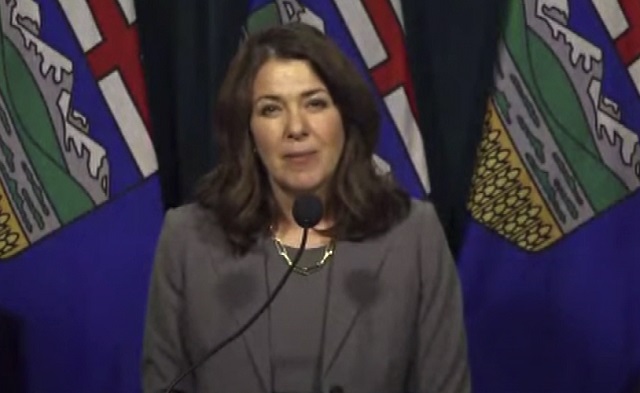
From LifeSiteNews
“I believe this is something I should talk about with my doctor, not media.”
Alberta Premier Danielle Smith made clear she will not disclose her personal COVID vaccination status.
“I think that a private medical decision should be kept private, and I think this is the reason why we have doctors giving the advice,” Smith said (23:15 min mark) to reporters on Thursday during a press conference announcing healthcare funding.
A legacy media reporter grilled Smith on COVID jab rates in the province, claiming that there was an “argument to be made” that politicians and health officials should set an “example” by “disclosing” their vaccination status.
Other reporters at the press conference were also crying foul over the Alberta government not spending millions of dollars on flashy “campaigns” as was done under former Premier Jason Kenney. Smith pointed out that the latest government press release around fall vaccinations states that shots for COVID and flu and all others are available to those who wish to get them.
Official data shows that about 15.5% of Albertans have chosen to get the COVID booster jab, which is on par with most provinces in Canada.
This is not the first time Smith has been asked by legacy media to disclose her COVID jab status. In September, she said she has a great “immune system,” but getting a shot is a matter to discuss only with her doctor and not the press.
“Look, I’m a healthy person, I tend to take care of my immune system,” Smith said in response to a question from a CBC reporter about fall COVID boosters.
“And I believe this is something I should talk about with my doctor, not media.”
In September, Health Canada approved a revised Moderna mRNA-based COVID shot despite research showing that 1 in 35 recipients of the booster ended up with myocardial damage. It then later approved Pfizer-BioNTech’s latest COVID jab.
Last week, LifeSiteNews reported on how an information request from a federal MP asking Health Canada if it has any clinical data showing whether Pfizer-BioNTech’s latest COVID jab is effective and safe after its recent approval of the shot has revealed the agency has no such data on file.
There is mounting evidence that all the mRNA-based COVID injections carry extreme risks, including for children.
A recent study by researchers at the Canada-based Correlation Research in the Public Interest found that 17 countries have a “definite causal link” between peaks in all-cause mortality and the fast rollouts of the COVID shots and boosters.
Adverse effects from the first round of COVID shots resulted in a growing number of Canadians filing for financial compensation over injuries from the jabs via the federal government’s Vaccine Injury Program (VISP).
Thus far, VISP has already paid $ 11,236,314 million to those injured by COVID injections, with some 2,000 claims remaining to be settled.
Smith earlier in the week, as reported by LifeSiteNews, promised to enshrine into “law” protections for people in her province who choose not to be vaccinated as well as strengthen gun rights and safeguard free speech by beefing up the provincial Bill of Rights.
“You have my commitment, no one’s going to be forced to be vaccinated,” Smith told Alberta blogger Shaun Newman.
Smith took over from Kenney as leader of the United Conservative Party (UCP) on October 11, 2022, after winning the party leadership. Kenney was ousted due to low approval ratings and for reneging on promises not to lock Alberta down as well as enacting a vaccine passport.
Under Kenney, thousands of nurses, doctors, and other healthcare and government workers lost their jobs for choosing to not get the jabs, leading Smith to say – only minutes after being sworn in – that over the past year the “unvaccinated” were the “most discriminated against” group of people in her lifetime.
Last month, a panel convened by Smith to investigate the previous government’s COVID governance released its findings, recommending many pro-freedom policies be implemented, such as strengthening personal medical freedoms via legislation so that one does not lose their job for refusing a vaccine as well as concluding that Albertans’ rights were indeed infringed on.
The panel was tasked to review “legislation and governance practices used by the Government of Alberta during the management of the COVID-19 public health emergency.”
Alberta
Preston Manning: Canada is in a unity crisis

 Preston Manning
Preston Manning
A Canada West Assembly would investigate why
The election of a minority Liberal government on Monday, and the strong showing of the Conservative party under Pierre Poilievre, cannot mask the fact that Canada remains seriously fractured on many fronts. Thus, one of the primary tasks of the Carney government will be to unite us for the sake of our own national well-being — not simply for the sake of presenting a strong front in future dealings with the United States.
But how is that to be done? When parliament meets as scheduled on May 26, will the government’s throne speech acknowledge the main sources of national disunity and propose the immediate adoption of remedial measures? Or will it ignore the problem entirely, which will serve to further alienate Quebec and the West from Ottawa and the rest of Canada, and weaken Canada’s bargaining position vis a vis the United States?
The principal tactic employed by the Liberal party to unite Canadians behind it in the recent election was to employ the politics of fear — fear of U.S. President Donald Trump trying to “break us so that America can own us,” as Liberal Leader Mark Carney has repeatedly said.
But if the only way to unite Canadians is through the promotion of anti-Americanism fostered by fear of some alleged American takeover — if reaction to the erratic musings of an American president is the only way to motivate more Canadians to vote in a federal election — then not only national unity, but Canadian democracy itself, is in critical condition.
We need to pinpoint what actually is fracturing the country, because if we can clearly define that, we can begin the process of removing those divisive elements to the largest extent possible. Carney and the Liberals will of course declare that it is separatist agitations in Quebec and now the West that is dividing us, but these are simply symptoms of the problem, not the cause.
Here, then, is a partial list of what underpins the division and disunity in this country and, more importantly, of some positive, achievable actions we can take to reduce or eliminate them.
First and foremost is the failure to recognize and accommodate the regional character of this country. Canada is the second-largest country by area on the planet and is characterized by huge geographic regions — the Atlantic, Central Canada, the Prairies, the Pacific Coast and the Northern territories.
Each of these regions — not just Quebec — has its own “distinctive” concerns and aspirations, which must be officially recognized and addressed by the federal government if the country is to be truly united. The previous Liberal government consistently failed to do this, particularly with respect to the Prairies, Pacific and Northern regions, which is the root of much of the alienation that even stimulates talk of western separation.
Second is Ottawa’s failure to recognize and treat the natural resources sector as a fundamental building block of our national economy — not as a relic from the past or an environmental liability, as it was regarded by the government of former prime minister Justin Trudeau.
Will the throne speech announce another 180-degree turn for the Liberal government: the explicit recognition that the great engine of the Canadian economy and our economic recovery is not the federal government, as Carney has implied, but Canada’s agricultural, energy, mining, forestry and fishery sectors, with all the processing, servicing, manufacturing and knowledge sectors that are built upon them?
A third issue we’ve been plagued with is the division of Canadian society based on race, gender, sexual preferences and other identity traits, rather than focusing on the things that unite us as a nation, such as the equality of all under the law. Many private-sector entities are beginning to see the folly of pursuing identity initiatives such as diversity, equity and inclusion that divide rather than unite, but will the Liberal government follow suit and will that intention be made crystal clear in the upcoming throne speech?
A final issue is the federal government’s intrusion into areas of provincial jurisdiction — such as natural resources, health, municipal governance, along with property and civil rights — which is the principal cause of tension and conflict between the federal and provincial governments.
The solution is to pass a federal “act respecting provincial jurisdiction” to repeal or amend the statutes that authorize federal intrusions, so as to eliminate, or at least reduce, their intrusiveness. Coincidentally, this would be a legislative measure that both the Conservatives and the Bloc could unite behind if such a statute were to be one of the first pieces of legislation introduced by the Carney government.
Polling is currently being done to ascertain whether the election of yet another Liberal government has increased the growing estrangement of western Canada from Ottawa and the rest of Canada, notwithstanding Carney’s assurances that his minority government will change its policies on climate change, pipelines, immigration, deficit spending and other distinguishing characteristics of the discredited Trudeau government.
The first test of the truthfulness of those assurances will come via the speech from the throne and the follow-up actions of the federal government.
Meanwhile, consultations are being held on the merits and means of organizing a “Canada West Assembly” to provide a democratic forum for the presentation, analysis and debate of the options facing western Canada (not just Alberta) — from acceptance of a fairer and stronger position within the federation based on guarantees from the federal government, to various independence-oriented proposals, with votes to be taken on the various options and recommendations to be made to the affected provincial governments.
Only time will tell whether the newly elected Carney government chooses to address the root causes of national disunity. But whether it does so or not will influence the direction in which the western provinces and the proposed Canada West Assembly will point.
Preston’s Substack is free today.
But if you enjoyed this post, you can tell Preston’s Substack that their writing is valuable by pledging a future subscription.
Alberta
Premier Danielle Smith hints Alberta may begin ‘path’ toward greater autonomy after Mark Carney’s win
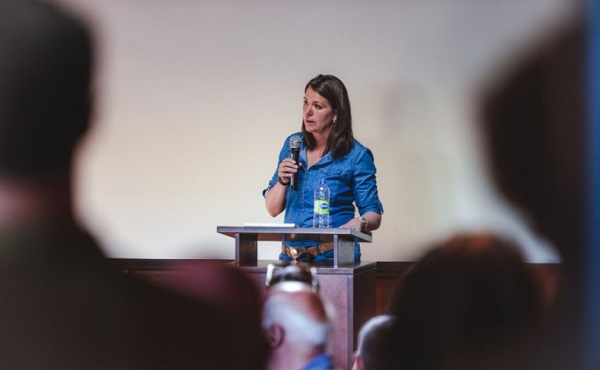
From LifeSiteNews
Alberta’s premier said her government will be holding a special caucus meeting on Friday to discuss Alberta’s independence.
Alberta Premier Danielle Smith hinted her province could soon consider taking serious steps toward greater autonomy from Canada in light of Mark Carney and the Liberal Party winning yesterday’s federal election.
In a statement posted to her social media channels today, Smith, who is head of Alberta’s governing United Conservative Party, warned that “In the weeks and months ahead, Albertans will have an opportunity to discuss our province’s future, assess various options for strengthening and protecting our province against future hostile acts from Ottawa, and to ultimately choose a path forward.”
“As Premier, I will facilitate and lead this discussion and process with the sincere hope of securing a prosperous future for our province within a united Canada that respects our province’s constitutional rights, facilitates rather than blocks the development and export of our abundant resources, and treats us as a valued and respected partner within confederation,” she noted.
While Smith stopped short of saying that Alberta would consider triggering a referendum on independence from Canada, she did say her government will be holding a “special caucus meeting this Friday to discuss this matter further.”
“I will have more to say after that meeting is concluded,” she noted.
Smith’s warning comes at the same time some pre-election polls have shown Alberta’s independence from Canada sentiment at just over 30 percent.
Monday’s election saw Liberal leader Mark Carney beat out Conservative rival Pierre Poilievre, who also lost his seat. The Conservatives managed to pick up over 20 new seats, however, and Poilievre has vowed to stay on as party leader, for now.
In Alberta, almost all of the seats save two at press time went to conservatives.
Carney, like former Prime Minister Justin Trudeau before him, said he is opposed to new pipeline projects that would allow Alberta oil and gas to be unleashed. Also, his green agenda, like Trudeau’s, is at odds with Alberta’s main economic driver, its oil and gas industry.
The federal government under Trudeau pushed since 2015 a radical environmental agenda similar to the agendas being pushed the World Economic Forum’s “Great Reset” and the United Nations “Sustainable Development Goals.”
The Carney government has also pledged to mandate that all new cars and trucks by 2035 be electric, effectively banning the sale of new gasoline- or diesel-only powered vehicles after that year.
The reduction and eventual elimination of the use of so-called “fossil fuels” and a transition to unreliable “green” energy has also been pushed by the World Economic Forum (WEF) – the globalist group behind the socialist “Great Reset” agenda – an organization in which Trudeau and some of his cabinet are involved.
Smith: ‘I will not permit the status quo to continue’
In her statement, Smith noted that she invited Carney to “immediately commence working with our government to reset the relationship between Ottawa and Alberta with meaningful action rather than hollow rhetoric.”
She noted that a large majority of Albertans are “deeply frustrated that the same government that overtly attacked our provincial economy almost unabated for the past 10 years has been returned to government.”
Smith then promised that she would “not permit the status quo to continue.”
“Albertans are proud Canadians that want this nation to be strong, prosperous, and united, but we will no longer tolerate having our industries threatened and our resources landlocked by Ottawa,” she said.
Smith praised Poilievre for empowering “Albertans and our energy sector as a cornerstone of his campaign.”
Smith was against forced COVID jabs, and her United Conservative government has in recent months banned men from competing in women’s sports and passed a bill banning so-called “top and bottom” surgeries for minors as well as other extreme forms of transgender ideology.
-

 Alberta1 day ago
Alberta1 day agoNew Alberta Election Act bans electronic vote counting machines, lowers threshold for recalls and petitions
-

 Alberta1 day ago
Alberta1 day agoHours after Liberal election win, Alberta Prosperity Project drumming up interest in referendum
-

 Alberta2 days ago
Alberta2 days agoPremier Danielle Smith responds to election of Liberal government
-
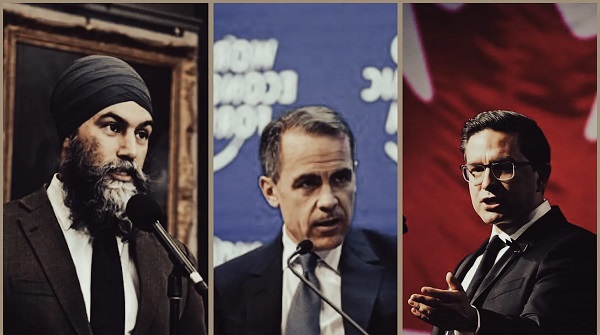
 2025 Federal Election12 hours ago
2025 Federal Election12 hours agoNDP Floor Crossers May Give Carney A Majority
-

 Banks1 day ago
Banks1 day agoTD Bank Account Closures Expose Chinese Hybrid Warfare Threat
-

 Alberta22 hours ago
Alberta22 hours agoPremier Danielle Smith hints Alberta may begin ‘path’ toward greater autonomy after Mark Carney’s win
-
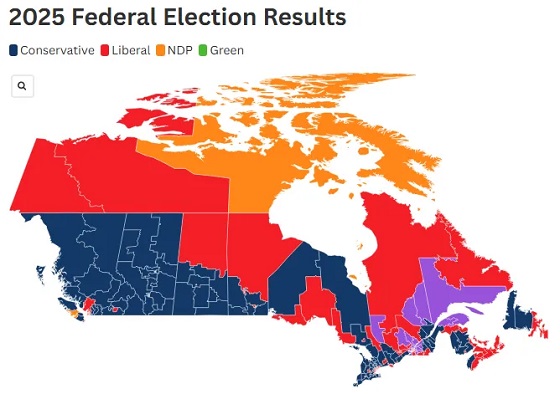
 2025 Federal Election1 day ago
2025 Federal Election1 day agoPost election…the chips fell where they fell
-
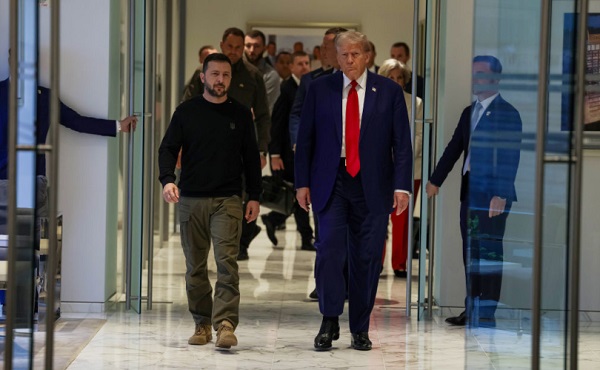
 Business7 hours ago
Business7 hours agoScott Bessent says U.S., Ukraine “ready to sign” rare earths deal

